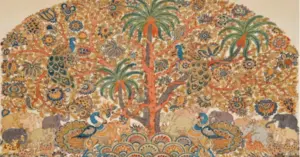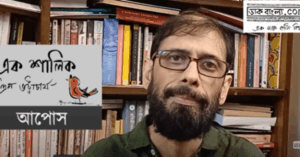Prayag, the point where the river Ganga joins the river Yamuna, near Allahabhad, is a sacred place in Hinduism. But it becomes especially sacred on the new moon day (amavasya) in the month of Magh (January-February) when the planet Jupiter enters the Zodiac House of Aquarius (Kumba) and the sun enters the Zodiac House of Aries (Mesha), an astronomical event that happens once in twelve years. When this alignment of stars and planets happens, the waters become especially sacred and millions come to bathe in the river. People believe a dip in that time will bestow upon them all good fortune. This of course is a matter of belief. What is important to note however is that the sacredness of the river is restricted by time. Before the celestial alignment, and after it, it becomes an ordinary river. Within the ‘muhurat’ it is special.
This same idea is seen when Hindus conduct rituals in the house invoking various deities. In keeping with ancient Vedic practice, the devata (deity) is invoked (avahana), appeased with offerings, and then bidden farewell (visarjan). This is also done at a special time, the muhurat, to ensure the deity has maximum ‘power’ to satisfy our wishes and grant us blessings.
Both the rituals at the river and in the household pay great importance to the idea of timing or ‘muhurat’. So it is with people in the corporate world. Everybody is actually a muhurat-wala devata, meaning of value to the organisation in a particular period of time, not before and not after. Every member of the organisation is valued as a deity or devata, but their value rises astronomically when market forces or the will of the shareholders creates a ‘muhurat’ when one person/role or another becomes especially important.
Both the rituals at the river and in the household pay great importance to the idea of timing or ‘muhurat’. So it is with people in the corporate world. Everybody is actually a muhurat-wala devata, meaning of value to the organisation in a particular period of time, not before and not after.
Thus when the market is shrinking, the marketing role becomes very important. A new marketing head is called for and celebrated as the most important person in the organisation, much to the irritation of the old devatas. When cost has to be brought down then the finance head becomes the muhurat-wala devata. When it’s time to end the financial year, the sales department matters more than marketing. When the business decides to enter the digital world, then the geeks in town, those who understand software and internet become the darlings of the organisation. When licenses are required then the liaison office that deals with government becomes especially sacred.
A devata must never get carried away by the devotion of the yajaman (the worshipper). He must remember that the devotion is based on a particular need fuelled by a particular circumstance. When the circumstance changes, when the need passes, the adoration ceases and the worship ends. In other words, devotion for a devata has a very clear expiry date. This can be traumatic for the devata if the devata does not keep in mind that all such relationships are contextual and never permanent. It is easy to get carried away by the affection and adoration of the yajaman, assume that the love with last forever. It does not.
When the circumstance changes, when the need passes, the adoration ceases and the worship ends. In other words, devotion for a devata has a very clear expiry date. This can be traumatic for the devata if the devata does not keep in mind that all such relationships are contextual and never permanent.
Many devatas therefore work hard not to solve the problem they have been invoked for. They keep the problem going to ensure devotion of the yajaman. Thus the CEO will always keep the fires burning so that the ‘muhurat’ is extended and the shareholder has valid reason to extend his term again and again.
Novices often find themselves in the giddy heights of yajaman-adoration, only to find themselves dropped one day, without warning. The heart breaks as the devotee retreats. But as Kumbha-mela and household rituals inform us — there is always another time when the devata will once again be needed. Needs are cyclical. Muhurat may end but it also eventually, inevitably, comes back. The devotees will return to the Prayag, albeit twelve years later.






